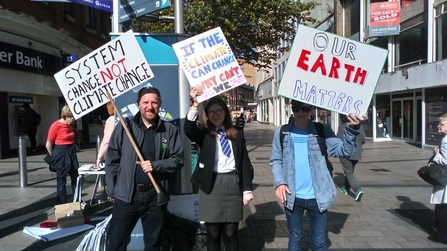Help shape the Climate Change Act for Northern Ireland
THE CONSULTATION CLOSED ON 1 FEBRUARY
THANK YOU TO EVERYONE WHO ADDED THEIR VOICE
A “Climate Emergency” was declared by the Northern Ireland Assembly on 03 February 2020 – this was in recognition of the urgent action and transformative change needed to stop human-induced global warming causing potentially irreversible environmental damage.
At a UK level, as a result of declaring a Climate Emergency, in 2019 greenhouse gas emissions reduction targets were dropped from 80% to Net Zero; Scotland took a step further, setting new greenhouse gas emissions target to Net Zero by 2045, while the Republic of Ireland has also committed to a Net Zero target by 2050.
However, a Net Zero target by 2050 only gives us a 50% chance that such action will keep average global warming to 1.5°C above pre-industrial levels. It is crucial we do everything we can to limit global warming to 1.5°C - the Intergovernmental Panel on Climate Change (IPCC) emphasised that 2°C or more of global warming could destroy ecosystems on around 13% of the world's land area, increasing the risk of extinction for many insects, plants and animals – in turn drastically altering the services these provide to humans and their role in human health. Holding warming to 1.5 °C would reduce that risk by half.
Northern Ireland may be a small country, but strong policy action underpinned by legally binding emissions reduction targets are essential for the UK to meet its commitments under the United Nations Framework Convention on Climate Change’s 2015 Paris Agreement, which aims to keep global warming to well below 2°C.
We have an opportunity now through the Government’s consultation on options for a Northern Ireland specific Climate Change Bill to send a clear message for urgent action to tackle greenhouse gas emissions across Northern Ireland, for a binding, challenging and ambitious Net Zero target for 2045, to limit the devastating impact climate change will have on nature and humanity. By setting ambitious goals we are taking action for future generations and showing our commitment to protecting the natural environment upon which we depend. This in turn will drive the policy action, investment and innovation needed to properly tackle the climate crisis.


